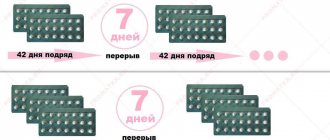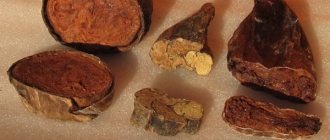Operating principle
Yarina is a monophasic oral contraceptive with a pronounced androgenic effect. The contraceptive effect is provided by two main components included in its composition:
- drospirenone (gestagen) – 3 mg;
- ethinyl estradiol (estrogen) – 30 mcg.
This ratio is maintained in all tablets, which are taken in a course of 21 days. Auxiliary components: modified starch, lactose, hypromellose, iron oxide, magnesium stearate, talc, titanium dioxide, macrogol, polyvidone.
Pharmachologic effect:
- Inhibition of ovulation processes.
- Thickening of cervical secretions. The increased thickness of mucus that accumulates in the cervix prevents the penetration of sperm.
- Creating conditions that are impossible for implantation of a fertilized egg into the endometrium, even if fertilization does occur.
Taking Yarina seems to deceive the body, forcing it to work as if ovulation has already passed. An egg that has matured in the body does not leave the follicle, which makes fertilization almost impossible. Many women are interested in whether it is possible to get pregnant while using the drug? Taking Yarina in accordance with the doctor’s recommendations and the rules of use provides 99% protection against unwanted pregnancy.
In addition to the contraceptive effect, Yarina has some additional medicinal properties:
- reduces pain during menstruation;
- restores the regularity of menstruation;
- reduces the volume of menstrual flow;
- pain in the lower abdomen goes away;
- prevents the development of iron deficiency anemia;
- reduces the risk of developing endometrial and ovarian cancer.
The use of the contraceptive Yarin for endometriosis is considered very effective. According to gynecologists, the drug successfully stops the progression of the disease, preventing the appearance of new pathological lesions. Of the gentle methods of combating endometriosis, this COC is considered the most effective. The drug is produced in Germany by the largest pharmaceutical company.
Yarina - instructions for use, reviews from doctors, price
Want to create a site? Find Free WordPress Themes and plugins.
Yarina is a monophasic hormonal drug that can be prescribed for the treatment of endometriosis, which is characterized as the growth of endometrial tissue beyond its normal growth.
If you stop taking the drug, the further development of endometriosis may be unpredictable . The initial stage of the disease can develop into a full-fledged pathological process.
Instructions for use of the drug Yarina
Yarina is a monophasic oral contraceptive with pronounced antiandrogenic properties.
In its chemical composition, the drug combines two active substances: ethinyl estradiol and drospirenone.
Being a low-dose contraceptive, the drug, first of all, inhibits the ovulation process by changing the viscosity of mucus on the cervix. Due to these processes, fertilization becomes impossible.
Being a complex drug, Yarina combines the properties of two active ingredients.
In turn, drospirenone has
anti-MKS activity, which prevents fluid retention in the body . In combination with ethinyl estradiol, the substance improves the lipid profile , thereby regulating the concentration of HDL.
In addition, the combination of two components gives a pronounced anti-acne effect, reducing the secretion of the sebaceous glands.
Drospirenone, having an affinity for natural progesterone, has neither androgenic nor estrogenic activity , which significantly reduces the number and frequency of side effects.
Like all monophasic hormonal contraceptives, Yarina has a positive effect on the woman’s body . The menstrual cycle improves , and bleeding is more easily tolerated and its duration is shortened, which significantly reduces the risk of developing anemia. The pain of menstruation decreases or disappears altogether.
Main indications for taking Yarina
As can be understood from the description of the drug, in most cases Yarina is used as a hormonal contraceptive . In addition, the following indications can be noted:
- Cosmetic regulation of sex hormones. As a result of the correction of the production of androgenic hormones, the activity of sebum production decreases, which leads to a decrease in the manifestation of skin diseases such as seborrhea and acne.
- Endometriosis. By suppressing the growth of endometrial epithelial cells, it leads to a decrease in the severity of menstrual bleeding
- Correction of water-salt balance. By taking the drug, the risk of peripheral edema is significantly reduced, and body weight is normalized.
Contraindications for taking Yarina
There are many contraindications to the use of the drug. Let's look at the main ones:
- Individual allergic reactions to the components of the hormonal drug
- pregnancy, lactation and breastfeeding;
- thrombosis of deep veins, angina pectoris, cerebrovascular disorders, transient ischemic attacks;
- benign and malignant neoplasms of the liver and kidneys;
- hormone-dependent tumors of the breast and reproductive organs;
- diabetes mellitus type 1 and 2
You should take the drug with caution in case of obesity, porphyria and otosclerosis . In addition, it is worth noting heart and vascular diseases, gastric ulcers and hemolyticouremic syndrome.
Side effects when using Yarina
Despite the fact that the drug is well tolerated in most cases, adverse reactions are still possible.
Headache, decreased emotional activity, vomiting, and dyspeptic symptoms are quite common.
In exceptional cases, a decrease in libido, an increase in body weight, and allergic rashes . of chloasma is extremely individual .
Interaction of Yarina with other drugs
It is worth noting that carbamazepine, phenytoin, many barbiturates and some other groups of compounds can significantly reduce the reliability of Yarina’s contraception, so this fact should be taken into account when taking these drugs. In addition, the combined use of Yarina with antibiotics of the penicillin group is undesirable, since the therapeutic effectiveness of both is reduced.
Features of the drug
Yarina’s progestin component, drospirenone, gives the drug some advantages that distinguish it from common contraceptives based on levonorgestrel and similar substances. Yarina prevents the appearance of edema, does not cause weight gain even with prolonged use, and has a positive effect on the condition of the skin and hair.
In addition, the pills relieve a woman of premenstrual syndrome. A weak diuretic effect helps prevent swelling, but potassium is retained in the body. The drug has an antiandrogenic effect: prevents hirsutism, treats acne, eliminates excess oily skin and hair. The estrogenic component of Yarina is typical, as in any COC. The sex hormone estrogen maintains normal ovarian function.
A woman’s body gets used to and adapts to Yarin’s tablets in 2-3 months. In the first months when you take the pills, you may experience irregular spotting or bloody vaginal discharge. If after three months of using Yarina the menstrual cycle has not returned to normal, or if malfunctions or side effects occur, you should visit a doctor.
Sometimes this COC is used to delay the start of the next menstrual cycle. If you start taking the next blister without a break, your period will not come. This should only be done as a last resort. By shortening the break between blisters, you can delay the onset of menstruation by several days.
Important! It should be remembered that if you stop or interrupt menstruation artificially, this is fraught with unpleasant consequences.
On forums, women often ask whether it is possible to get pregnant while taking Yarina? If you take the pills correctly, without skipping them, the chance of conception is less than 1%. Pregnancy after Yarina can occur almost immediately, so it is important not to miss a dose.
Yarina reviews from doctors pros and cons for endometriosis reviews
Yarina for uterine fibroids, essentially a drug with a low-dose contraceptive effect, helps normalize the menstrual cycle, eliminates painful symptoms of menstruation, reduces the amount of blood loss and blocks the ovulation process.
Due to its composition, this drug is successfully used as a prophylaxis against anemia, malignant neoplasms in the endometrium of the uterus and ovaries.
When taking Yarina, a positive effect on the condition of the skin and relief from swelling was noticed.
Janine or Yarina: which is better?
Endometriosis is often called a disease of civilization. Although it has been known to doctors since the 19th century, it was only with the advent of effective contraceptives that the disease became widespread. In times when there were no such contraceptives, a woman gave birth on average 8-9 times, and menstruation was much less frequent.
Today, the number of periods during the entire reproductive period is approximately 400. This load on the female reproductive system does not go unnoticed: more and more cases of endometriosis are appearing, which, in the absence of adequate treatment, provokes various complications in women, including infertility.
According to clinical data, every tenth modern woman suffers from this pathology, and in terms of prevalence the disease firmly ranks 3rd. To combat the disease, more and more new drugs with multiple effects are being invented. Such means are contraceptives Janine or Yarina, but which is better depends on each specific case.
Often, gynecologists leave the right of choice to the patient. But it is sometimes very difficult for a person ignorant of medicine to understand their difference. Therefore, it is worth taking a close look at the features of each of them.
Brief information about endometriosis
The endometrium is the lining of the uterine cavity necessary for the attachment of the zygote (fertilized egg). If conception does not occur, the tissue is rejected by the organ and comes out as menstruation.
In some cases, endometrial particles can attach to the tissues of other organs: fallopian tubes, ovaries. Part of the endometrium enters the abdominal cavity, where it is utilized by its cells.
There are known cases where, as they moved, particles penetrated and took root in the lungs, kidneys and other organs.
After the endometrium is implanted into tissues outside the uterus, it begins to function under the influence of hormones produced by the ovaries, as in its “native” place.
This pathological functioning of individual lesions in uncharacteristic locations is called endometriosis.
It manifests itself as spotting between menstruation, pain in the lower abdomen, and in some cases causes uterine bleeding.
In the absence of quality treatment, endometrial growth becomes uncontrollable and contributes to many serious complications, causing ectopic pregnancy and infertility.
Similarities and differences between drugs
Medicines belong to one group of hormonal contraceptives. Both are intended to prevent conception and are produced by the same manufacturer - the German concern Bayer.
The composition is also similar: the common component is ethinyl estradiol, presented in the drugs in one dosage - 30 mcg per pill. But this is where the identity ends: the second active component in Janine is dienogest, and in Yarin it is drospirenone. Excipients also differ in the set of ingredients and their dosage.
The dosage form of contraceptives differs insignificantly - Zhanine is produced in the form of pills under a film shell, Yarina is produced in tablets.
Interaction with other drugs
Treatment of adenomyosis, which involves taking Silhouette, may temporarily exclude the use of other drugs or weaken their effect. You definitely need to know about this. Hormonal contraceptives may reduce effectiveness:
- antibiotics;
- antifungal drugs;
- antiviral drugs.
In turn, these same medications reduce the contraceptive effect that Silhouette has. Before starting a course of treatment, your doctor must tell you what medications you are taking. This also applies to the treatment of other diseases. The specialist should know that the patient is taking COCs.
It is completely contraindicated to combine Silhouette with:
- preparations created on the basis of St. John's wort;
- antidepressants;
- anti-anxiety drugs;
- antibiotics.
Features of the drug Zhanine in the treatment of endometriosis
Janine’s main purpose is to prevent unwanted conception. This effect is ensured by the combined action of its two active components: ethinyl estradiol and dienoget. The first substance is an artificially synthesized analogue of natural estrogen.
Accordingly, it acts identically to the hormone: it blocks the secretion of gonadotropins by the brain, suppresses the work of the ovaries to produce hormones, and thickens vaginal secretions. But the main thing is that it suppresses the growth of the endometrium. The second compound, dienogest, is a hybrid substance with the characteristics of progestins and northerstosterone.
It has antiandrogenic properties, has a beneficial effect on the content of lipids in the blood, and prevents the development of corticosteroid pathologies.
The regimen for using the drug depends on the purpose of the prescription: for a contraceptive effect, the drug must also be taken during a 21-day course of one tablet, after which a break is observed, during which withdrawal bleeding occurs, similar to menstruation. At the end of the week's respite, they begin taking the pills again.
How to drink pills for endometriosis
The advantage of Zhanine over other contraceptives is that it can be prescribed for different degrees of the disease: both with initial manifestations and with complex forms. Therefore, an individual regimen is selected for each patient. On average, it is suggested to drink the pills continuously for two months, that is, 63 days.
The recommended dosage is one pill per day. After completing the course, a 7-day break is taken for withdrawal bleeding. On what day the discharge begins depends on the individual characteristics of the female body.
The need for further use of Janine is discussed with the gynecologist, since usually one cycle of therapy is enough to suppress the growth of the endometrium.
In more complex cases, a woman may be prescribed a longer course, then she will need to drink the pills for 84 days, after which the medication is discontinued to allow menstrual-like bleeding to occur.
Possible side effects
Any synthetic drug can cause unpleasant effects, and Janine is no exception. Although the contraceptive is generally well tolerated by the body, there are also undesirable consequences of taking it:
- Psycho-emotional disorders (depression, nervousness, irritability, etc.)
- Breast tenderness and tenderness
- Head pain
- Beli
- Disturbance of the gastrointestinal tract (nausea, flatulence, less often - diarrhea and vomiting)
- Increased body weight (mainly in overweight women with a predisposition to obesity), etc.
Side effects may develop at the initial stage of use or after completion of the course. in some cases, the effects go away on their own, but it is better to consult your gynecologist about the specifics of the intake.
Yarina against endometriosis
The multicomponent drug is a low-dose monophasic contraceptive of modern development. Its action is provided by two active substances - ethinyl estradiol and drospirenone. Pregnancy prevention is achieved through several processes at once.
During Yarina's course, ovulation is suppressed and at the same time the structure of cervical secretion changes. It becomes so thick and viscous that sperm cannot penetrate the uterine cavity.
In addition, the contraceptive suppresses the growth of the endometrium, which is necessary for the complete attachment of a fertilized egg.
Admission and Cancellation Rules
Details about the use of the drug can be found in the instructions that come with each package. Oral contraceptive Yarina should be taken 1 tablet daily at the same time, for a course of 21 days, then take a seven-day break. On what day during the break your period will begin depends on the individual characteristics of the female body. Usually menstruation begins on the second or third day, and the discharge ends when the next course begins.
The tablets are easy to use, as the blister contains the names of the days of the week according to the day of administration. On the eighth day, you need to start taking pills from a new package, even if your periods have not stopped, that is, you do not need to wait for the discharge to completely end.
If your period does not start during a seven-day break, it may be the body’s reaction to some component of the drug. In this case, you need to contact a gynecologist and get tested for hormones. If, on the contrary, your periods do not stop for more than 10 days while taking a contraceptive, then be sure to visit a doctor. Usually the discharge ends after taking a tablet from a new package. If taken regularly there should be no deviations. After a seven-day break, even if the bleeding has not stopped yet, you still need to take the first tablet.
Similarities and differences between medicines
In the group of monophasic OCs, the drugs have an identical composition. Combined hormonal contraceptives in tablets contain 2 active substances:
- ethinyl estradiol;
- drospirenone.
They differ in the dose of the progesterone analogue – drospirenone. Yarina's drug contains 3 mg of gestagen and 30 mcg of estrogen, which is better tolerated by women and manifests itself in the female body. The package consists of 21 tablets, designed for a menstrual cycle of 28 days.
The advantages of the drug Yarina over Zhanine are as follows:
- Yarina is a newer and more active drug due to the content of a larger proportion of the main components.
- Yarina's absorption period is shorter - 1.5 hours than Zhanine's, which averages 2-2.5.
- The list of contraindications for prescribing Yarina is also smaller. If you have problems with metabolism, “Zhanine” is contraindicated. Yarina, on the contrary, is indicated for weight loss and normalization.
- After stopping taking Yarina, a positive effect of the drug is observed, while “Zhanine” is effective only during the treatment course.
Preparations with hormones have an active effect on the entire body, regardless of the dose of the main components and their combination. Self-prescription and long-term use are strictly not advisable without examination and doctor’s recommendations.
How to start taking pills
For a detailed description, see the instructions; we will focus only on the important details:
- At the initial appointment, the course begins on the first day of menstruation. You can take it from days 2 to 5, but in this case you need to take additional protection for the first week.
- If a woman switches to Yarina after another oral contraceptive, it is better to start taking it from the first day of the menstrual cycle, but it is also possible after a seven-day break.
- When switching to Yarina from an IUD or contraceptive implant, the course of contraception begins on the day of removal of these devices.
- If you refuse contraceptive injections, the first pill should be taken on the day of the next scheduled procedure.
- After giving birth, you can use Yarina to protect yourself after 28 days. In the first week, additional contraceptive measures are needed.
- After an abortion up to 12 weeks, Yarina can be taken on the same day.
- After surgical interventions, the drug can be taken 14 days after the condition has returned to normal.
It is important to avoid interruptions when using oral contraceptives. In all of these cases, an additional method of contraception is required in the first week of taking COCs.
Missing an appointment
If a woman has forgotten to take the next pill, she must proceed as follows: if the delay is less than 12 hours, she must take the tablet as early as possible, and then continue taking it as usual. In this case, the contraceptive effect is retained in full.
If a woman forgot to take a pill and more than 12 hours have passed, she needs to urgently take the missed pill (you can take 2 at the same time). When the missed period is more than 36 hours, the contraceptive effect is reduced.
If you miss taking the drug for a long time in the first and second weeks of the course, you must take additional precautions. If a woman misses her dose in the third week, there are 2 options:
- Take the tablet as quickly as possible (you can take 2 tablets at once) and continue to take the drug until the package runs out. Then you need to immediately start taking it from the new blister without a week's break. In this case, spotting is possible, but this is not critical.
- Stop taking the pills and take a seven-day break, then take the drug as usual. If you miss 1 tablet in the third week without violating the regimen of taking the drug in the previous period, the contraceptive effect is maintained.
It should be noted that diarrhea or vomiting immediately after taking the drug is considered a missed dose, since the tablet is not fully absorbed. In this situation, take another tablet immediately.
Cancellation of the drug is possible on any day of the cycle, but it is better to drink the full course to the end (21 days). A delay in menstruation after discontinuation of Yarina occurs extremely rarely; normally, the menstrual cycle should fully recover within three months.
If your periods come irregularly for more than four months, then you need to visit a gynecologist. A delay in menstruation after stopping birth control pills may be associated with the development of a gynecological disease. After cancellation, Yarina’s contraceptive effect ends on the next day, so you need to immediately start protecting yourself with barrier methods.
You can take Yarina monthly for 5 years, then you need to give your body a rest, or better yet, switch to another contraceptive. Taking Yarina does not disrupt metabolic processes in the body, so women who took these contraceptive pills for several years in a row did not complain of deteriorating health.
The dose and duration of COC use in the treatment of endometriosis should be selected by the doctor, but generally a standard regimen is recommended. In case of planned surgery, a woman should stop taking contraceptives one month before surgery. If emergency surgery is to be performed, the doctor should be aware of the drug to take measures against thrombosis.
Does the drug Yarina help in the treatment of endometriosis? Endometriosis and Yarina Plus
- 1 Composition of the contraceptive
- 2 Indications for use
- 3 How does Yarina help with endometriosis?
- 4 Contraindications and side effects
- 5 Missed appointment
- 6 How to lose weight with endometriosis?
- 7 The tissue lining of the uterus is also called the endometrium. When it grows outside the uterus, there are a number of symptoms that may occur, including:
- 8 Characteristics of the drug Yarina 8.1 Effect of the drug
- 8.2 Contraindications
Moderate activities include exercises such as walking, dancing and gardening. Vigorous activities include exercises such as running, cycling and swimming.
Removing the uterus alone may not be effective because the ovaries are what produces estrogen and can create tissue pain throughout the body. This intervention is usually reserved for the most common cases of the disorder.
The composition of 21 Yarina tablets includes 2 main substances:
- ethinyl estradiol (typical estrogen at a dose of 30 mcg);
- drospirenone (a gestagen in a dose of 3 mg, which has several positive effects beneficial to the female body).
Birth control pills, as doctors' reviews show, are well tolerated by women and help prevent unplanned conception and medical abortion. Contraception is the main purpose of prescribing this tablet drug. Yarina does not always cope with therapeutic tasks, so doctors rarely use this contraceptive to treat endometriosis.
Indications for use
In addition to the contraceptive effect, the hormonal drug can be a good factor for normalizing the menstrual cycle and preventing sudden weight gain. These effects are provided by the gestagenic component - Drospirenone has the following effects on the female body:
- correction of water and mineral metabolism, which reduces the risk of edema and weight gain;
- regulation of the production of androgen hormones, which helps fight acne and seborrhea;
- suppression of endometrial growth, which reduces the severity of menstrual blood loss.
The doctor will advise you to take the drug Yarina:
- to prevent unwanted conception;
- with a high risk of rapid weight gain;
- with a tendency to edema;
- against the background of problem skin, acne and high oily hair;
- with an irregular menstrual cycle.
The therapeutic effect for endometriosis is minimal, so you should not expect a decrease in pain when taking Yarina. However, at stage 1 of endometrioid disease, when there are no severe symptoms, the drug can be used.
How does Yarina help with endometriosis?
Yarina is prescribed due to the hormonal nature of the development of endometriosis, as it develops against the background of an increase in the amount of estrogen and a decrease in progesterone. The first hormone is responsible for the proliferation of endometrial tissue and its restoration to normal size after menstruation. With an excess of estrogen, pathological processes are possible.
Progesterone can suppress the activity of estrogen, but only if its amount also increases. If its concentration is within normal limits, and estrogen is increased, tissue proliferation is inevitable. The drug "Yarina" contains both of these hormones and, with regular use, promotes:
- Restoring hormonal balance;
- Stopping tissue proliferation;
- Resorption of neoplasms;
- Reduced severity of menstrual bleeding.
Yarina is prescribed to young and middle-aged women for the treatment of endometriosis. The drug is not indicated for the elderly (when menopause has already occurred).
Contraindications and side effects
The drug should not be taken in the following conditions:
- Hypersensitivity;
- Thrombosis;
- Ischemia;
- Diabetes;
- Severe liver diseases;
- Oncological diseases of some organs and systems;
- Bleeding from the uterus of unknown origin;
- Pregnancy and lactation.
Side effects include breast engorgement and migraines. Treatment is symptomatic.
Missing an appointment
You need to drink Yarina at the same time every day so that the same concentration of hormones is constantly maintained in the body. If you miss a pill, you should do the following:
- if less than 12 hours have passed since the moment when you needed to take the pill, take another capsule, and then stick to your usual regimen;
- if more than 12 hours have passed since the moment when you should have taken the pill, take two capsules, and then stick to your usual regimen.
If the break between taking the pill is more than a day, the therapeutic effect of Yarina decreases.
An increase in estrogen synthesis begins in a woman’s body, which can cause ovulation. Starting the work of the ovaries will provoke the activity of foci of endometriosis, which is extremely undesirable for the patient. Therefore, it is important to take the hormonal drug at a strictly prescribed time without skipping.
Vomiting and diarrhea that occurs within two hours after taking the capsule is similar to skipping a medication. It is recommended to take the pill again to avoid negative consequences.
How to lose weight with endometriosis?
Many online resources that provide information about natural and alternative treatments recommend that women suffering from endometriosis fight excess weight with the help of special diets. However, there is no scientific evidence that any specific diet can cause weight loss or relieve symptoms of endometriosis.
Surgeries to remove particles of ectopic endometrial tissue often help control pain and bloating. By achieving these effects, women can lose weight.
In any situation, the formula for losing weight is simple - you need to burn more calories than you consume. Patients with endometriosis can implement this strategy using the following recommendations.
- Increase your level of physical activity. Walk as often as possible and take breaks between periods of low activity. It is recommended that each person engage in 150 to 300 minutes of moderate-intensity cardio exercise per week or 75 to 150 minutes of vigorous-intensity cardio exercise per week. In addition, doctors recommend doing strength training at least twice a week.
- Consume nutritious and low-calorie foods. Avoid sweets and carbonated drinks.
- Consume proteins. Proteins improve metabolism and help a person feel full longer. This reduces the desire to snack on high-calorie foods.
Women with endometriosis can discuss weight loss strategies with their doctor, especially if they have other medical problems such as PCOS.
The tissue lining of the uterus is also called the endometrium. When it grows outside the uterus, there are a number of symptoms that may occur, including:
painful menstrual cycles
- excessive bleeding
- bloat
- infertility
- Weight gain may not be a direct symptom of endometriosis, but certain aspects of the disorder and its treatment can cause the pounds to drop.
This includes:
hormonal imbalances
- some medications
- hysterectomy
- Hormones Your hormones are not balanced
Characteristics of the drug Yarina
Treatment involving a hormonal course can be of many types, depending on the level of biologically active substances found in the patient’s blood tests. It is better if your personal gynecologist prescribes contraceptives, since such drugs affect not only the menstrual cycle.
Effect of the drug
"Yarina" is prescribed by gynecologists, dermatologists, and endocrinologists.
The tool functions in several directions:
- Stopping menstruation, therefore, benign growths stop developing. The effect is achieved by preventing the release of the egg from the ovaries. Ovulation does not occur.
- The secretion of a special secretion in the uterus, which resembles mucus, is reduced. It becomes difficult for sperm to penetrate to the neck of the reproductive organ.
- This OC contains drospirenone. The substance neutralizes hormones that promote excess weight gain (causing increased appetite) and removes excess fluid from cells.
- Combating male pattern hair growth (on the face, arms, chest and abdomen), reduces the amount of acne (due to slowing down the activity of the sebaceous glands).
- This monophasic drug contains a combination of estrogen and gestagens (progesterone). First, the “feeding” of tumors stops, and then they stop developing, and processes of degeneration are possible.
The optimal course of treatment is prescribed for six months.
Contraindications
Treatment of emerging endometriosis with this method has positive reviews.
But there are also contraindications, the manifestation of which should be immediately reported to the gynecologist (perhaps he will cancel the drug and prescribe a new one):
- After stopping the use of this product, the body gradually restores its own hormonal regulation, and hair loss may occur. It is better to take specially prescribed vitamins during therapy.
- Pain in the mammary glands, discomfort, discharge (a rare sign).
- Nausea and/or vomiting. Occurs in 1% of patients.
Treatment with this monophasic drug interacts with certain medications. So, antibiotics (the same penicillin and tetracycline-containing medications) reduce its effect. In this case, you need to use additional options for protection.
Therapeutic agents to combat tuberculosis, on the contrary, increase the effect of hormonal OCs. This combination can lead to uterine bleeding.
It is better for the gynecologist to know in advance about taking other drugs during the course of hormonal therapy (“Yanina”, “Zhanin”, “Diane-35” and other drugs).
Reviews from doctors about Yarin
According to experts, Yarina is a drug with pronounced contraceptive activity. However, in the treatment of endometriosis the drug is prescribed very rarely, due to the low therapeutic effect on this particular disease. A doctor may prescribe Yarina for endometriosis in cases where the disease does not manifest itself in any way and is almost asymptomatic.
The cost of the drug is 1090 rubles
Side effects
Like any medicine, Yarina can cause a number of side effects. The most common of them are irregular bleeding from the genital tract, soreness of the mammary glands, nausea, and indigestion.
Less commonly observed:
- weight change;
- decreased libido;
- rash, urticaria;
- instability of the emotional background;
- the appearance of discomfort when wearing contact lenses;
- recurrent headaches;
- allergic reactions.
If these symptoms are present, consultation with a gynecologist is necessary. Perhaps Yarin's tablets are not suitable for a woman, and she will need to change her method of contraception.
Doctor's opinion
According to obstetricians and gynecologists, low-dose drugs in the form of Yarina help suppress male sex hormones in a woman’s body, which serves to prevent the development of uterine fibroids, and long-term use of which prevents the development of oncological tumors in the reproductive organs. However, in the case of some diseases, especially in the presence of cardiovascular pathologies, the use of this drug can lead to thrombosis. Therefore, before making an appointment, it is necessary to conduct a comprehensive examination and make sure there are no contraindications.
You can leave your feedback on the results of Yarina’s treatment for uterine mima, endometriosis, adenomyosis or other gynecological disease in the comments below, they will be useful to other users of the site!
Natalya, Moscow
I was diagnosed with uterine fibroids, and for some reason the doctor prescribed treatment with the hormonal drug Yarina, which is used as a contraceptive. Moreover, he convinced me that it is the properties of this remedy that help reduce fibroids due to a thinner layer of the endometrium. The only good thing is that the hormone content in it is minimal and does not affect health.
Valeria, Vladivostok
I took Yarina for fibroids, since this tumor made it difficult to get pregnant. I took this drug for three months, there was no effect (as it turned out, there shouldn’t have been, since ovulation did not occur), and I quit. An ultrasound showed that the size of the nodes decreased slightly, and two months later I became pregnant.
Contraindications
Contraindications to taking Yarina are:
- all types of vascular thrombosis and the presence of any factors that increase their occurrence (arrhythmia, hypertension, previous strokes and heart attacks, heart defects);
- pre-thrombosis conditions (angina pectoris, ischemic attacks);
- neurological disorders (sustained migraines);
- diabetes with vascular complications;
- pancreatitis with hypertriglyceridemia;
- malignant neoplasms;
- kidney or liver dysfunction;
- pregnancy;
- lactation period;
- individual intolerance;
- vaginal bleeding of unknown origin.
Compatibility with other pharmacological drugs
Medicines that reduce the contraceptive effect of Yarina:
- antibiotics (tetracyclines, penicillins);
- anti-tuberculosis drugs;
- barbiturates;
- antiepileptic drugs;
- anti-HIV drugs;
- medicines based on St. John's wort.
Analogues and substitutes
| Name | Differences | Note |
| Yarina Plus | Additionally contains the active form of folic acid. | The drug is similar in mechanism of action and price, improves blood composition. |
| Janine | Drospirenone has been replaced by dienogest. Not prescribed for metabolic disorders. | Higher price. Used for intolerance to drospirenone. |
| Regulon | Drospirenone has been replaced by desogestrel. Prescribed for the treatment of fibroids and ovarian cysts. | Lower price. Has no cosmetic effect. |
| Novinet | Drospirenone has been replaced by desogestrel. Can be taken during lactation. | There is no anti-edematous effect. Lower price. Reduces the risk of developing anemia. |
| Jess | Contains a smaller amount of ethinyl estradiol (20 mcg). | Another schedule for taking pills (24/4). Minimal risk of thrombosis. |
Other structural analogues of Yarina: Modell Pro, Anabella, Midiana. Only a doctor can choose the optimal COC option depending on the patient’s health condition. In Russia, the price of the drug Yarina varies from 900 to 1300 rubles, it is sold in any pharmacy.
- Use of the drug Zhanine in the treatment of endometriosis, reviews
Yarina is a safe and effective new generation contraceptive that helps preserve women's health and prevent unwanted pregnancy. Before using the medication, you should definitely consult a gynecologist, since all oral contraceptives affect women's health.
How to take Yarina for endometriosis
Yarina for endometriosis helps prevent the formation of new lesions and normalize a woman’s hormonal levels. The drug is prescribed to patients of different ages after assessing the benefits and risks.
The medicine is a monophasic low-dose drug, so most women tolerate the treatment well.
The duration of use of the medication is determined by the degree of endometriosis, as well as the desire to have a child.
Analogues and substitutes
Among the wide range of hormonal agents that have a similar effect, one can highlight absolute and relative substitutes for the drug Yarina.
Absolute analogues include medications containing the same active ingredients: Jess, Midiana, Dimia, Modell Trend, Vidora and others.
Oral contraceptives are actively used for the treatment of endometriosis: Qlaira, Janine, Diane-35, Novinet, Regulon.
A potent alternative to Yarina for endometriosis are drugs based on gonadotropin-releasing hormones.
The drug Yarina Plus should also be noted. This product contains the same active substances as its predecessor. The only difference is the additional component - calcium levomefolate. This substance replenishes folic acid deficiency, removes excess fluid from the body and regulates the process of hematopoiesis.
Patient reviews
Elena Bobyleva, 42 years old
I have had internal endometriosis for several years. At first I took different hormonal drugs, then I stopped. Recently there was severe bleeding, they took me to the hospital and did a cleaning (curettage). After the operation, menstruation did not start for a long time, the doctor prescribed Yarina to be treated for six months. When I started drinking Yarina, my lower abdomen became very painful, swelling and pain in my legs appeared, but after 3 weeks everything went away. After three months, I was checked by ultrasound, they said that the lesions were inactive and did not grow further, which means that the drug still helps.
Galina Reshetnikova, 29 years old
I was diagnosed with early endometriosis, but this does not make it any easier, because I have not been able to get pregnant for several years. The gynecologist prescribed treatment for Yarina for 3 months. I’ve been taking it for the second month now, the drug suits me, there are no side effects, although my breasts swell a little before my period. I noticed that there was less discharge during menstruation, and the usual pain disappeared. True, for the first month I forgot to take the pills at the same time, I was afraid that a spot would start, but it passed.
What's better? Janine or Yarina?
Well, this is more the exception than the rule, so you don’t have to go to the dentist so as not to die from the anesthesia and not get infected with AIDS.
There are 90% positive reviews about Jess! I took Logest 3 years ago, but I felt sick and cried for 2 months, then ok, I took it for 3 years
[quote=”Svetlanka”]And I want to share my experience in taking Janine. In 2009, I had a laparectomy, removed the endometrial cyst, and cauterized the external endometriosis. After that, I was offered the choice of either Yarina or Zhanina, supposedly they regress endometriosis. For some reason, I chose Zhanine then, I took them for six months. For the first month, I had smears every day and My chest hurt a lot, but after taking the second package it all went away. I didn’t gain any weight from them, and my appetite was always good. My skin became clearer, the pain disappeared. BUT. the most important thing! after stopping the pills, the cycle went very wrong, the pain returned after 1.5 months, and it became even stronger. I just couldn’t breathe, I was screaming like crazy, my hands and lips were cramping, and after another month my periods became very heavy, I’ve never had anything like this, so that in 4 days 2 packs of pads go away, you don’t even have to leave the house. Just pieces of it. I began to fall, my periods began to last for 12 days, I can stop them with the help of injections!! I went to the doctor, there were no cysts, but they recognized endometriosis of the uterine body, I tested TSH and prolactin, everything is normal. They prescribed me Janine again.. But it only got worse. My period started on December 22, the 31st period ended, and on January 7th it started again, at first it bled a little, and then it just poured, and I ran to the doctor, the pill was canceled, and I haven’t taken the 20th and 21st pills, I’m still the same It’s pouring, it hurts, I can’t touch my chest, the acne has gotten even bigger. The doctor said that Zhanina has a low content of hormones, and that’s why I have breakthrough bleeding, now I’m trying to stop it. After 7 days I was prescribed to drink Logest, supposedly there is more hormone, but it has drainage is contraindicated, especially for blood vessels, and is it suitable for endometriosis?










